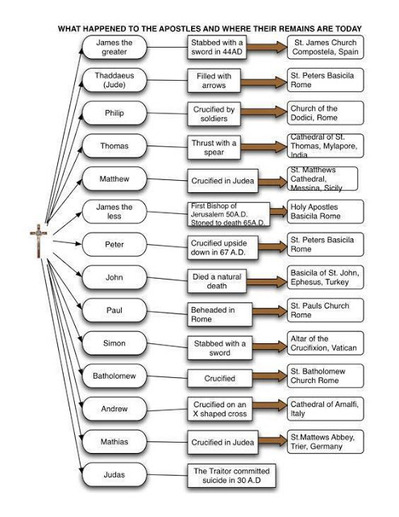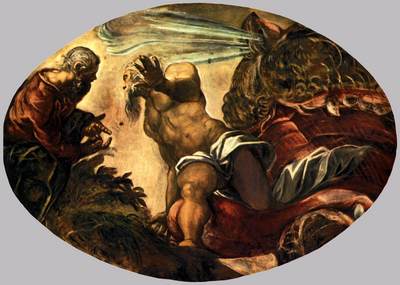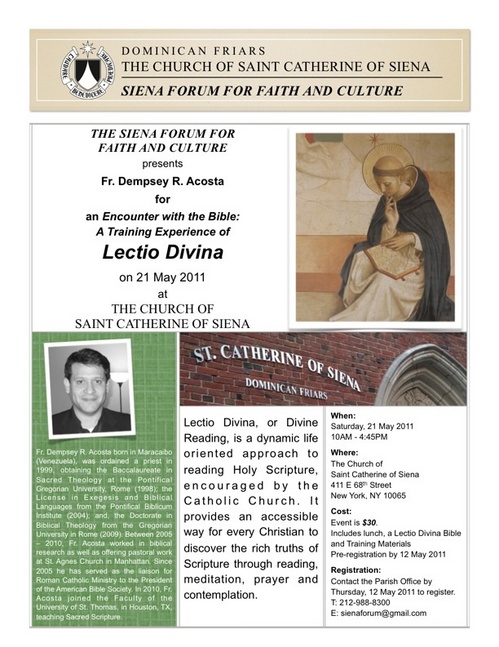Recently in Sacred Scripture Category
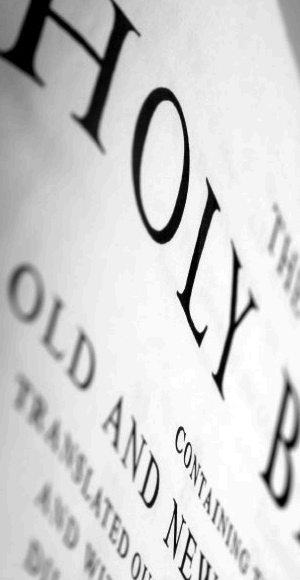
Yesterday, the Holy Father met with the members of the Pontifical Biblical Commission (PBC) led by German Archbishop Gerhard Ludwig Müller, prefect of the Congregation for the Doctrine of the Faith. The theme the PBC's annual plenary assembly was "Inspiration and Truth in the Bible." On the personal and parish level, this theme is revisited year-in and year-out. Catholics (and the Orthodox) have a particular way of praying, reading, studying and living the sacred Scripture that is very different from the Protestant ecclesial communities: from WITHIN the context of the living community of faith, i.e., the Liturgy.
Pope Francis paid close attention to this year's work of the PBC by saying it "affects not only the individual believer but the whole Church, for the Church's life and mission are founded on the Word of God, which is the soul of theology as well as the inspiration of all of Christian existence."
He noted that in Dei Verbum the emphasis of what the nature of Scripture is, how the Church interprets Scripture, what is conserved by the Church, and by whose authority is at work. I think one of the "money quotes" is when Francis reminded us that "The interpretation of Sacred Scriptures cannot be just an individual academic effort, but must always be compared to, inserted within, and authenticated by the living tradition of the Church."
The point we Catholics have to come to understand and to work on is that we are a biblically based religion, like none other, established by Jesus Christ, and preaching Him since 33 AD. We can't get away from the Scriptures and that's why bible study AND lectio divina are crucial every day. The Scriptures are testimony of how God works and humanity responds to God's invitation.
Here is the Pope's text:
I am pleased to welcome you at the end of your annual Plenary Assembly. I thank the President, Archbishop Gerhard Ludwig Müller, for his greeting and summary of the topic that has been the subject of careful consideration in the course of your work. You have gathered again to study a very important topic: the inspiration and truth of the Bible. It is a matter that affects not only the individual believer, but the whole Church, for the life and mission of the Church is founded on the Word of God, which is the soul of theology and the inspiration of all Christian life .
What was true and real for the Apostles and disciples of the Lord 2000 years ago IS TRUE AND REAL for us today, right now. At least that's what I believe. The Emmaus event is not an abstract account but a true encounter with a clear direction and goal: knowing that the Lord Jesus, once crucified and now risen, is alive as He said. I find myself asking:
Can you say with the same degree of certainty as the disciples of Emmaus came to understand, that it is a true joy to walk with others in and outside the Church over the years in light of the presence of the Risen Lord? Do you really believe it is your vocation to recognize the Risen Lord in the breaking of the Bread, and to help others to the same? How do you account for the joy in knowing the Lord and accepting the reality of the Lord's enduring Presence in the Eucharist? Are ready to enter into worship upon recognizing the Lord at the Supper of Emmaus?
The question becomes for the Christian: what do you really want from the Risen Lord?
Yesterday in Rome some of the seminarians from the USA received the minor ministry of Acolyte from Archbishop J. Augustine DiNoia, OP, 68, native of the Bronx, NY, and vice-president of the Pontifical Ecclesia Dei commission. Don't miss the gardner ... he's important in Jesus' narrative. Part of DiNoia's homily is here.
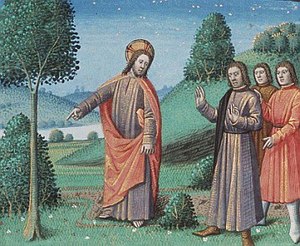
Our Lord's examples in today's Gospel are like this--instances of catastrophes everyone has heard about. He anticipates what his hearers might be thinking: do these events have some religious or moral significance? Were the Galileans whose blood Pilate mixed with their sacrifices greater sinners than all other Galileans, or were the eighteen people upon whom the tower in Siloam collapsed greater sinners than all the inhabitants of Jerusalem?
His response to the questions he poses is brief and deceptively simple. The lesson to be drawn from these events is most surely not that those who perished were greater sinners than those who survived or were entirely unaffected. Rather it is this: if we do not repent, all of us will perish. In fuller terms the point is that since all of us are sinners, and the end of life can be so unexpected, then there can be no reason to postpone repentance. Nothing is to be gained by procrastination. If we knew that our lives were going to come to an end on such and such a day in the future--say, ten years from now--then we could delay repentance until a safe interval before that date. But we don't know this. Death will be as unexpected for us as for those who perished in these catastrophes.
Our Lord underscores precisely this point by means of the parable of the fig tree. Though the fig tree has been barren for three years, the owner of the orchard agrees to give it a reprieve: one more year. Likewise, God is patient with our procrastination, with our failure to bear the fruit of true repentance, but not indefinitely so. "With fear and trembling," says St. Gregory the Great, "should we hear the words...., 'cut it down'.... He who will not by correction grow rich unto fruitfulness, falls to that place from whence he is no longer able to rise by repentance."(Homily 31 on the Gospel of Luke).
But there is a bright side to today's sobering Lenten message--as it happens something wonderfully apt on this occasion of the Institution of Acolytes. It is to be found in the humble figure of the gardener in the parable of the fig tree. For it is at his suggestion--we might well say his intercession--that the owner of the orchard gives the barren fig tree yet another year. "Let us not then strike suddenly," says St. Gregory Nazianzen, "but overcome by gentleness, lest we cut down the fig tree still able to bear fruit, which the care perhaps of a skillful dresser will restore" (Oration 32). Not only does the gardener put in a good word for the fig tree, but he has a plan for improving its chances of bearing fruit in the coming year: to dig around the tree and fertilize it, to give it special care.
The figure of the gardener is easy to miss, but in the rich tradition of patristic commentary on this parable he gets a lot of attention. A particularly significant reading of the parable sees him as representing Christ who implores the Father to allow him to water the tree with his teaching and his sufferings so that it will yield the fruit of repentance and good works.
Archbishop J. Augustine Di Noia, O.P.
Third Sunday of Lent: Institution of Acolytes
3 March 2013
Pontifical North American College, Rome
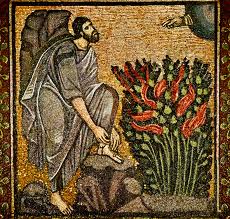
Moses encountered the living God. What was once hidden is now made known. Light and Love is experienced. Biblical revelation teaches that he flame Moses saw was in fact God's uncreated energies/glory. This glory of God was manifested as light, thus a reasonable theological explanation as to why the bush was not consumed. The Church doesn't typically speak of the burning bush as a miracle inasmuch as it speaks of it as an event, a theophany, an epiphany, which lasts but a short time. What is taught by the Church Fathers is that Moses was permitted to see God's uncreated energies/glory. That is, he had encountered the Infinite, a promise of eternal things to come. Moses is for us the note that we are made for the Infinite, that our heart is made for love, that we are to be in communion with the Divine Majesty.
This same light is linked to the experience of the children at Fatima
Catholic theology speaks of the burning bush as an Old Testament type for Mary, the Theotokos. She, as the Spouse of the Holy Spirit "is the burning bush of the definitive theophany" (CCC 724). The burning bush which Moses experienced is spoken of by the Church Fathers as the type of Jesus, an experience that is "pre-incarnation." That is to say, the bush is the encounter with the presence of the Son in the form of an Angel. Mary, therefore, is the Theotokos, the bearer of the Incarnate Son by the action of the Holy Spirit.
We welcome this Light into our lives through the sacraments of initiation, the frequent reception of the sacraments of Confession and Communion; we welcome this Light in our begging the Holy Spirit to guide our way to God the Father as a new Pentecost in our Christian experience. Our response is nothing other than adoration of God.
As a way to know more about the Holy Spirit and the Divine action in history I would recommend studying the Catechism of the Catholic Church, paragraphs 717-730.
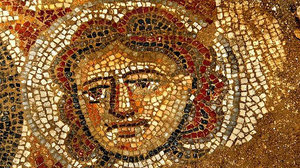 The finding of an ancient artifact in an area where it would not be likely and from an era when it would seem to be improbable is a wonderful thing. The Huqoq mosaic of Samson fighting the Philistines from the 5th and 6th centuries is indeed remarkable. One of the reasons finding this mosaic is important to the field of biblical archeology is that it unearths, as it were, the preconceptions of what religious life whether it was Byzantine Christianity or Judiasm and reorients previously held theories. Revision of one's thinking can be a good thing when you face the reality in front of you. Yahoo News is carrying the story from July 2, 2012.
The finding of an ancient artifact in an area where it would not be likely and from an era when it would seem to be improbable is a wonderful thing. The Huqoq mosaic of Samson fighting the Philistines from the 5th and 6th centuries is indeed remarkable. One of the reasons finding this mosaic is important to the field of biblical archeology is that it unearths, as it were, the preconceptions of what religious life whether it was Byzantine Christianity or Judiasm and reorients previously held theories. Revision of one's thinking can be a good thing when you face the reality in front of you. Yahoo News is carrying the story from July 2, 2012.
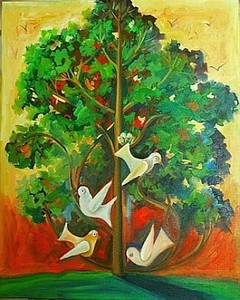 The Lord loves parables. Today's parable is the one about the mustard seed growing into a big tree for all the birds to make a home. A fitting typology for heaven. But it is only a metaphor but a reality: the small becomes great. As Sofia Cavalletti said, "The person who at a certain point becomes aware of the dynamic nature of the Kingdom of God, which is like a mustard seed, will gradually come to see this dynamism filling the universe and empowering man and his history" (Religious Potential of the Child, 165). Jesus, in today's gospel, fixes our attention on the place we have in His Father's Kingdom here on earth and with Him in heave: our growth, transformation and conversaion is slow and purpose-filled. It is a recognition of the Mystery.
The Lord loves parables. Today's parable is the one about the mustard seed growing into a big tree for all the birds to make a home. A fitting typology for heaven. But it is only a metaphor but a reality: the small becomes great. As Sofia Cavalletti said, "The person who at a certain point becomes aware of the dynamic nature of the Kingdom of God, which is like a mustard seed, will gradually come to see this dynamism filling the universe and empowering man and his history" (Religious Potential of the Child, 165). Jesus, in today's gospel, fixes our attention on the place we have in His Father's Kingdom here on earth and with Him in heave: our growth, transformation and conversaion is slow and purpose-filled. It is a recognition of the Mystery.The first reading at Mass today was taken from the Book of Wisdom. Not a regularly heard from book of the Bible. The Church offers us at least two things today with regard to Wisdom: what is it (how do we define what it is) and who is Wisdom?
Both Saint John the Evangelist and Saint Paul indicate that Wisdom is Jesus Christ. You might say that the contents of the Book of Wisdom is perfected in the person of Jesus Christ. With that in mind, here's what we heard today.
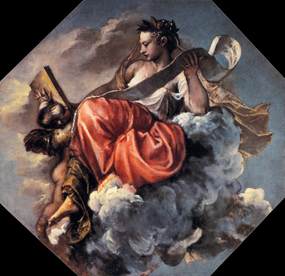
In Wisdom is a spirit
intelligent, holy, unique,
Manifold, subtle, agile,
clear, unstained, certain,
Not baneful, loving the good, keen,
unhampered, beneficent, kindly,
Firm, secure, tranquil,
all-powerful, all-seeing,
And pervading all spirits,
though they be intelligent, pure and very subtle.
For Wisdom is mobile beyond all motion,
and she penetrates and pervades all things by reason of her purity.
For she is an aura of the might of God
and a pure effusion of the glory of the Almighty;
therefore nought that is sullied enters into her.
For she is the refulgence of eternal light,
the spotless mirror of the power of God,
the image of his goodness.
And she, who is one, can do all things,
and renews everything while herself perduring;
And passing into holy souls from age to age,
she produces friends of God and prophets.
For there is nought God loves, be it not one who dwells with Wisdom.
For she is fairer than the sun
and surpasses every constellation of the stars.
Compared to light, she takes precedence;
for that, indeed, night supplants,
but wickedness prevails not over Wisdom.
Indeed, she reaches from end to end mightily
and governs all things well.
Wisdom 7:22b-8:1
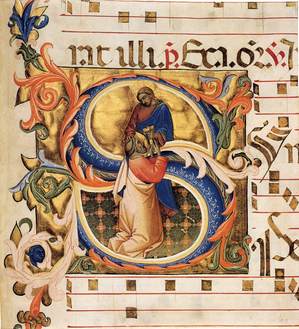
Jesus went into the region of Caesarea Philippi and he asked his disciples, "Who do people say that the Son of Man is?" They replied, "Some say John the Baptist, others Elijah, still others Jeremiah or one of the prophets." He said to them, "But who do you say that I am?" Simon Peter said in reply, "You are the Christ, the Son of the living God." Jesus said to him in reply, "Blessed are you, Simon son of Jonah. For flesh and blood has not revealed this to you, but my heavenly Father. And so I say to you, you are Peter, and upon this rock I will build my church, and the gates of the netherworld shall not prevail against it. I will give you the keys to the kingdom of heaven. Whatever you bind on earth shall be bound in heaven; and whatever you loose on earth shall be loosed in heaven." Then he strictly ordered his disciples to tell no one that he was the Christ. (Matthew 16 13-20)
A challenging gospel passage for people who are skeptical about Christ being THE Way, and giving the keys to Peter and thus to the Church. We have to ask ourselves: Who do you say Jesus is? Do you take His words seriously? Is Peter's confession of Jesus believable? Do you know the Church in a loving and faith-filled way?
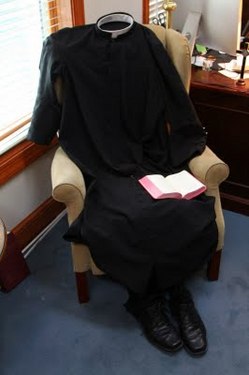 The rapture came and went...and this guy got caught up in it. Good for him. The rest of us will meander along...but in case you want to join the others in the rapture, the actual date is now October 21. So I am told. But what time should people be ready? Harold Camping, founder of Family Radio and rapture prophet. Camping might be ready for the rapture as he's now recovering from a stroke. The 89 year old prophet of doom-and-gloom-Christian-style alters his guaranteed prediction of Judgement Day every so often.
The rapture came and went...and this guy got caught up in it. Good for him. The rest of us will meander along...but in case you want to join the others in the rapture, the actual date is now October 21. So I am told. But what time should people be ready? Harold Camping, founder of Family Radio and rapture prophet. Camping might be ready for the rapture as he's now recovering from a stroke. The 89 year old prophet of doom-and-gloom-Christian-style alters his guaranteed prediction of Judgement Day every so often.The Pontifical Biblical Commission is a group of theologians and scriptural scholars who help the Pope and the teaching mission of the Church exploring particular questions and concerns about the nature and reality of divine revelation and Christian life. The PBC is meeting this week in Rome led by Cardinal William J. Levada, Prefect of the Congregation for the Doctrine of the Faith; the theme is "Inspiration and Truth of the Bible." Interesting. Did we forget that the sacred Scriptures were inspired by the Holy Spirit? One way of figuring out why something is important to the Pope or to sacred Magisterium is to be aware of the work done by these commissions. So, yes, there seems to be skepticism among the faithful that the Scriptures are revealed by God through the agency of human language. Recall, however, this is not the first time in salvation history that the Church has had to deal with this question: think of the various heresies from the early Church, the Renaissance, Reformation, and Enlightenment periods and even with the extreme use of the historical critical method of Scripture study. His Holiness reminds not only the professionally trained scholars but all of us that there can be in no way a reduction in how we interpret the Bible.
Here are the key points of what Benedict said to the PBC:
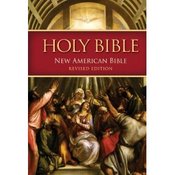 The other day there was some press, most of it inane, about the revised edition of the New American Bible.
The other day there was some press, most of it inane, about the revised edition of the New American Bible.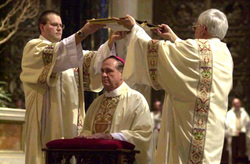 At a priest's ordination as bishop the Book of the
Gospels is held open over the man's head by two deacons, a way to communicate that the
Scriptures are crucial to the life of the bishop and that Christ has infused
His Word in his heart and mind. Archbishop Timothy Broglio said this when he
ordained Bishop Spencer in 2010:
At a priest's ordination as bishop the Book of the
Gospels is held open over the man's head by two deacons, a way to communicate that the
Scriptures are crucial to the life of the bishop and that Christ has infused
His Word in his heart and mind. Archbishop Timothy Broglio said this when he
ordained Bishop Spencer in 2010: 